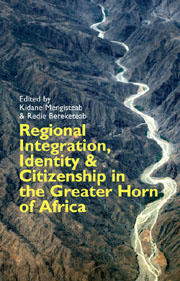Book contents
- Frontmatter
- Contents
- List of Tables, Figures & Appendices
- Notes on Contributors
- Acknowledgements
- List of Acronyms
- Part One RELEVANCE OF INTEGRATION TO IDENTITY AND CITIZENSHIP
- Part Two CRITICAL FACTORS IN INTEGRATION
- 4 Invisible Integration in the Greater Horn Region
- 5 Nationalist, Sub-nationalist, and Region-wide Narratives and the Quest for Integration-promoting Narratives in the Greater Horn Region
- 6 Infusion of Citizenship, Diversity and Tolerance in the Education Curriculum: Promoting Regional Integration and Peace in the Greater Horn Region
- 7 Radio and the Propagation of Anti- and Pro-Ethiopian Narratives in Somalia
- Part Three LESSONS FROM SELECTED AFRICAN INTEGRATION SCHEMES
- Index
- EASTERN AFRICAN STUDIES
7 - Radio and the Propagation of Anti- and Pro-Ethiopian Narratives in Somalia
from Part Two - CRITICAL FACTORS IN INTEGRATION
Published online by Cambridge University Press: 05 February 2013
- Frontmatter
- Contents
- List of Tables, Figures & Appendices
- Notes on Contributors
- Acknowledgements
- List of Acronyms
- Part One RELEVANCE OF INTEGRATION TO IDENTITY AND CITIZENSHIP
- Part Two CRITICAL FACTORS IN INTEGRATION
- 4 Invisible Integration in the Greater Horn Region
- 5 Nationalist, Sub-nationalist, and Region-wide Narratives and the Quest for Integration-promoting Narratives in the Greater Horn Region
- 6 Infusion of Citizenship, Diversity and Tolerance in the Education Curriculum: Promoting Regional Integration and Peace in the Greater Horn Region
- 7 Radio and the Propagation of Anti- and Pro-Ethiopian Narratives in Somalia
- Part Three LESSONS FROM SELECTED AFRICAN INTEGRATION SCHEMES
- Index
- EASTERN AFRICAN STUDIES
Summary
INTRODUCTION
One of the major sources of political and social instability in the Horn of Africa region has been the historically precarious relationship between Ethiopia and Somalia. Experts agree that the most destructive conventional war between two independent African states was waged between these two neighbours in the 1977–78 Ogaden War.
The conflict, which assumed global dimensions through the massive intervention of the former Soviet Union and Cuba on the Ethiopian side, and the United States, Italy, and Arab League nations on the Somali side, eventually led to the collapse of the Somali state as well as spawning the 20-year cycle of violence that has since defined that country.
Somali-Ethiopian animosities have been fuelled by belligerent narratives that have been passed down through the generations for several centuries. These narratives, contained in folk tales, idioms, poems and proverbs, invariably demonize the other ethnic group and have kept the two peoples from realizing the mutual benefit of facing their common destiny together.
Analysts such as Mengisteab and Tilley identify social narratives as a key criterion variable in determining mutual perceptions among identity groups that can, in turn, promote or undermine regional integration.
After first explaining the origins of conflict between Somali and Amhara ethnic groups, this chapter will focus on traditional and contemporary narratives that have defined inter-group and inter-state relations between Somalia and Ethiopia.
- Type
- Chapter
- Information
- Publisher: Boydell & BrewerPrint publication year: 2012



